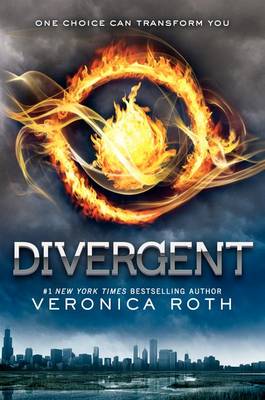Reviewed by nannah on
Because although I wanted to be swept away into the craze, Divergent left me feeling pretty lukewarm. Don't get me wrong, Roth definitely has some skill as an author. She can put together some beautiful sentences and really create some fantastic imagery when she wants to. However, overall, I don't think the story came together as something that worked for me.
I think the main problem is the plot structure. For the first half of the book, I'm not quite sure what the plot actually is. It's only in the last quarter that things start to pull together, and then rush like it's supposed to have been building the entire novel. I always find that in these books where the protagonist goes off and trains somewhere that the actual training takes up most of the beginning (and in this case also the middle) and it's only halfway in or afterwards that the actual story begins. It's a pattern I'm seeing more and more often nowadays . . . But back to Divergent's main "plot," it was so hastily and sloppily done that I felt cheated by the end of the book. Not to mention there were so many character deaths that lacked purpose or focus. It felt like a climax that Roth wanted to feel climactic without having thought about why it would be climactic compared to the events that had happened thus far. Especially seeing that the villain's motives didn't seem to make any sense to me.
Another thing here is what the whole book's about: Divergence. There are supposedly five factions that make up current society: the Abegnation (the selfless-people who run the government), the Erudite (the intelligent-people who, I don't know, research and invent things), the Candor (the honest, and I've no idea what they do! Someone, please tell me, what do these people actually do?), the Amity (the peaceful, farmers and the like), and the Dauntless (the brave, basically in charge of security, etc.). And THEN there are the factionless, people who've lost their faction and get basically blue-collar jobs. They're considered to be the scum of the earth pretty much and a waste of resources, thank you for that, Roth. Thank you for that horrible and disturbing message.
But my real issue with these factions is that . . . how do they even work together to form a society that even functions? Even sort of functions? It's said that these factions formed when society fell apart, but how would this be a possible solution? Sure, it fits for creating this certain plot line, but I feel like Roth didn't think this through. AND particularly, how would they EVER agree to make one faction in charge of the ENTIRE government? How does that make sense? And you wonder why later they start to think, "Man, I don't think that was such a good idea." --> insta-plot, yo! It's beginning to feel like this whole book was a first draft that needed more thought. Also, why aren't there more people who are Divergent? There can't be so few people whose thinking spans different areas. Really, there can't. PLUS why would they let people switch factions?? Wouldn't that allow for people's thinking to change and expand, thus making them Divergent? Or are you only "born that way"?
Okay, I'll stop there with that, and I'll move onto our protag, Tris. Why, oh why, must authors try and downplay their main women characters by playing the "I'm ugly" card? Especially if she's blonde-haired, blue-eyed, flat-chested and skinny (sounds like most models to me). Plus she kept on repeating it over and over, along with "I'm short" all the time. I kept waiting for the "I'm short" thing to be used as an advantage because of how often it had been repeated, but apparently it was just used to make her more flawed, which I object to. Vehemently!! Besides this, she kept remarking on other people's appearances in horrible ways. The villain in particular (which only appeared for a second) was body-shamed, described by our protag--who was shot, may I add, and bleeding, and yet needed to note that the bad character had a spare tire and stretch marks. Thank you for this. Because we all know everyone who's evil are the ones who look less pretty than you.
Thank you.
I'd also like to add that the book kept putting guns in such a positive light. She felt safe when she had guns. Guns were the answer to EVERYTHING. Guns=solutions. Every time. Every single time.
All right, I'm getting increasingly more bitter as this review goes on. I didn't hate this book, really I didn't. But I didn't like it all that well, either. I kept thinking it'd have more to offer than the lousy, hastily-added war plot line tagged on at the end. Unfortunately I just couldn't get into it.
Reading updates
- Started reading
- 8 February, 2013: Finished reading
- 8 February, 2013: Reviewed
